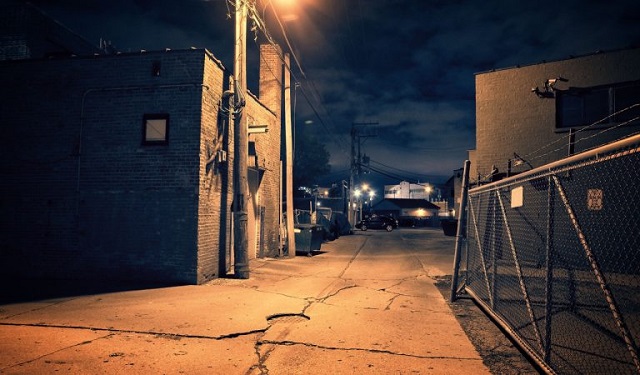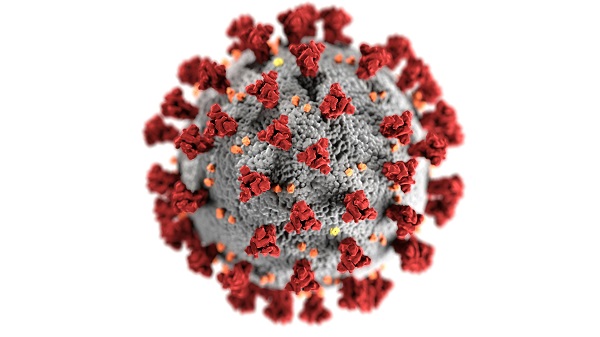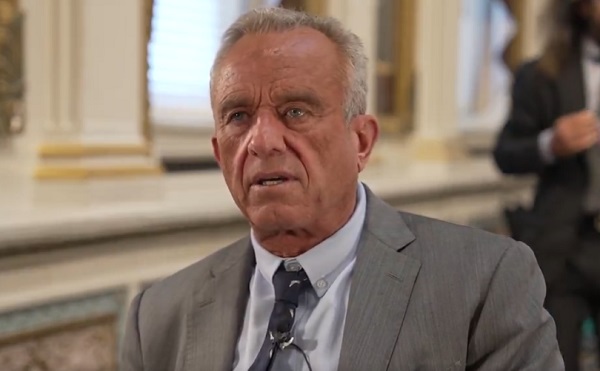Censorship Industrial Complex
Lockdowns Codified a World of Violence

From the Brownstone Institute
During the misnamed and mostly preposterous debate between Kamala Harris and Donald Trump, a moderator fact-checked Trump’s claim that crime is up. In contrast to his claim, he said that the FBI reports that crime is down, a claim that likely struck every viewer as obviously wrong.
Shoplifting was not a way of life before lockdowns. Most cities were not demographic minefields of danger around every corner. There was no such thing as a drug store with nearly all products behind locked Plexiglas. We weren’t warned of spots in cities, even medium-sized ones, where carjacking was a real risk.
It is wildly obvious that high crime in the US is endemic, with ever less respect for person and property. As for the FBI’s statistics, they are worth about as much as most data coming from federal agencies these days. They are there for purposes of propaganda, manipulated to present the most favorable picture possible to help the regime.
This is certainly true of the Bureau of Labor Statistics and the Commerce Department, which have been shoveling out obvious nonsense for years. Professionals in the field know it but go along for reasons of professional survival. In truth, we’ve never had a real economic recovery since lockdowns.
Crime is up. Literacy is down. Trust has collapsed. Societies were shattered and remain so.
Only a few weeks following the officious fact check at the debate, we now have new data from the National Crime Victimization Survey. The Wall Street Journal reports: “The urban violent-crime rate increased 40% from 2019 to 2023. Excluding simple assault, the urban violent-crime rate rose 54% over that span. From 2022 to 2023, the urban violent-crime rate didn’t change to a statistically significant degree, so these higher crime rates appear to be the new norm in America’s cities.”
The report isolates the “post-George Floyd protests” because no media source wants to mention the lockdowns. It is still a taboo subject. We somehow cannot say, even now, that the worst abuses of rights in US history in terms of scale and depth were a disaster, simply because saying so implicates the whole of the media, both parties, all government agencies, academia, and all the upper reaches of the social and political order.
The problem of political division is getting alarmingly serious. It’s no longer just about competing yard signs and loud rallies. We now have regular assassination attempts, plus even an extremely strange appearance of a bounty put on a candidate’s head by an official agency.
Surveys have shown that 26 million people in the US believe that violence is fine to keep Trump from regaining the presidency. Where might people have gotten that idea? Probably from many Hollywood movies that fantasize about having killed Hitler before he accomplished his evil plus the nonstop likening of Trump to Hitler, and hence one follows from another.
Liken Trump to Hitler and that is the result you produce. Just as the lockdowns and pandemic response acted out the Hollywood production of the movie Contagion – a perfect example of life imitating art – many activists today want to play a role in a real-life version of Valkyrie.
What’s next, the real-life version of “Civil War?”
There is private violence, public violence, and many forms in between including vigilante violence. Rights violations against person and property are the desiderata of our times. This springs from the culture of our times which has been heavily informed and even defined by the deployment of state violence in service of policy goals, at a scale, scope, and depth never before seen.
There were moments following March 12, 2020, and for the next two years, when there was no way to know for sure what was allowed and what was not, who was enforcing the orders (much less why), and what would be the consequences of noncompliance. We seem to have been subject to a range of coercive edicts but no one was sure of their source or the penalties for noncompliance. We were all introduced into the real-world workings of martial-law totalitarianism, which took forms we somehow did not expect.
There is probably not a living soul without some bizarre story. I was thrown out of several stores for issues of mask compliance even though it was unclear whether there were mandates. It all depended on the day. There was one store where the proprietor was laughing about masks one day and enforcing them the next, following a threat from an angry customer that he would call the police.
Businesses that tried to reopen were closed by force. Violence was threatened against beachgoers. Churches gathered in secret. House parties were extremely risky. Later, refusing the shot meant being barred from the office, though once more it was not clear who precisely was enforcing the order and what the consequences would be for noncompliance.
When CISA – about which no one knew anything because it had been created only in 2018 – sent out its sheet about which industries were essential and which were nonessential, it was not clear precisely who would make the determination or what would happen if the judgment was wrong. Where was the enforcement arm? Sometimes it would appear – threatening visits from inspectors or checks by police – and other times not so much.
On that day, I was riding back from New York City on the Amtrak and suddenly found myself overwhelmed with the possibility that the train could be stopped and all passengers thrown into a quarantine camp. I sheepishly asked an employee about the possibility. He said “It’s possible but, in my view, unlikely.”
That’s what it was like for years ongoing. Even now the rules are unclear, and this is especially true when it comes to speech. We are merely feeling our way around a dark room. We are shocked when a vaccine-critical post stays up on Facebook. A video on YouTube that mentions censorship might stay up or be taken down. Most dissidents today have been demonetized from YouTube, which is nothing but an effort to financially ruin our best creators.
Censorship is the deployment of force in service of state power, and other institutions connected to state power, for purposes of culture planning. It is exercised by the shallow state, in response to the middle state, and on behalf of the deep state. It is a form of violence that interrupts the free flow of information: the ability to speak, and the ability to learn.
Censorship trains the population to be quiet, afraid, and constantly stressed, and it sorts people by the compliant vs the dissidents. Censorship is designed to shape the public mind toward the end of shoring up regime stability. Once it starts, there is no limit to it.
I’ve mentioned to people that Substack, Rumble, and X could be banned by the spring of next year, and people respond with incredulity. Why? Four years ago, we were locked in our homes and locked out of churches, and the schools for which people pay all year were shut down by government force. If they can do that, they can do anything.
Censorship has been so effective that it has changed the way we engage with each other even in private. Brownstone Institute just held a private retreat for scholars, fellows, and special guests. One very special guest wrote me that she was completely shocked at the freedom of thought and speech that was present in the room. As a mover in the highest circles, she had forgotten what that was like.
This censorship coincides with a strange valorization of violence that we are presented with from all over the world: Ukraine, the Middle East, London, Paris, and many American cities. Never have so many held video cameras in their pockets and never have there been so many platforms on which to post the results. One does wonder how all these relentless presentations of destruction and killing affect public culture.
What purpose are all these soft, hard, public, and private exercises of violence serving? The standard of living is suffering, lives are shortening, despair and ill-health are main features of the population, and illiteracy has swept through an entire generation. The decision to deploy violence to master the microbial kingdom did not turn out well. Worse, it unleashed violence as a way of life.
“When plunder becomes a way of life for a group of men in a society,” wrote Frédéric Bastiat, “over the course of time they create for themselves a legal system that authorizes it and a moral code that glorifies it.”
That is precisely where we are. It’s time we talk about it and name the culprit. Liberty, privacy, and property were already unsafe before 2020 but it was the lockdowns that unleashed Pandora’s box of evils. We cannot live this way. The only arguments worth having are those that name the reason for the suffering and offer a viable path back to civilized living.
Censorship Industrial Complex
Welcome to Britain, Where Critical WhatsApp Messages Are a Police Matter

By
“It was just unfathomable to me that things had escalated to this degree,”
“We’d never used abusive or threatening language, even in private.”
|
You’d think that in Britain, the worst thing that could happen to you after sending a few critical WhatsApp messages would be a passive-aggressive reply or, at most, a snooty whisper campaign. What you probably wouldn’t expect is to have six police officers show up on your doorstep like they’re hunting down a cartel. But that’s precisely what happened to Maxie Allen and Rosalind Levine — two parents whose great offense was asking some mildly inconvenient questions about how their daughter’s school planned to replace its retiring principal.
This is not an episode of Black Mirror. This is Borehamwood, Hertfordshire, 2025. And the parents in question—Maxie Allen, a Times Radio producer, and Rosalind Levine, 46, a mother of two—had the gall to inquire, via WhatsApp no less, whether Cowley Hill Primary School was being entirely above board in appointing a new principal.
What happened next should make everyone in Britain pause and consider just how overreaching their government has become. Because in the time it takes to send a meme about the school’s bake sale, you too could be staring down the barrel of a “malicious communications” charge.
The trouble started in May, shortly after the school’s principal retired. Instead of the usual round of polite emails, clumsy PowerPoints, and dreary Q&A sessions, there was… silence. Maxie Allen, who had once served as a school governor—so presumably knows his way around a budget meeting—asked the unthinkable: when was the recruitment process going to be opened up?
A fair question, right? Not in Borehamwood, apparently. The school responded not with answers, but with a sort of preemptive nuclear strike.
Jackie Spriggs, the chair of governors, issued a public warning about “inflammatory and defamatory” social media posts and hinted at disciplinary action for those who dared to cause “disharmony.” One imagines this word being uttered in the tone of a Bond villain stroking a white cat.
|
 |
Parents Allen and Levine were questioned by police over their WhatsApp messages. |
|
For the crime of “casting aspersions,” Allen and Levine were promptly banned from the school premises. That meant no parents’ evening, no Christmas concert, no chance to speak face-to-face about the specific needs of their daughter Sascha, who—just to add to the bleakness of it all—has epilepsy and is registered disabled.
So what do you do when the school shuts its doors in your face? You send emails. Lots of them. You try to get answers. And if that fails, you might—just might—vent a little on WhatsApp.
But apparently, that was enough to earn the label of harassers. Not in the figurative, overly sensitive, “Karen’s upset again” sense. No, this was the actual, legal, possibly-prison kind of harassment.
Then came January 29. Rosalind was at home sorting toys for charity—presumably a heinous act in today’s climate—when she opened the door to what can only be described as a low-budget reboot of Line of Duty. Six officers. Two cars. A van. All to arrest two middle-aged parents whose biggest vice appears to be stubborn curiosity.
“I saw six police officers standing there,” she said. “My first thought was that Sascha was dead.”
Instead, it was the prelude to an 11-hour ordeal in a police cell. Eleven hours. That’s enough time to commit actual crimes, be tried, be sentenced, and still get home in time for MasterChef.
Allen called the experience “dystopian,” and, for once, the word isn’t hyperbole. “It was just unfathomable to me that things had escalated to this degree,” he said. “We’d never used abusive or threatening language, even in private.”
Worse still, they were never even told which communications were being investigated. It’s like being detained by police for “vibes.”
One of the many delightful ironies here is that the school accused them of causing a “nuisance on school property,” despite the fact that neither of them had set foot on said property in six months.
Now, in the school’s defense—such as it is—they claim they went to the police because the sheer volume of correspondence and social media posts had become “upsetting.” Which raises an important question: when did being “upsetting” become a police matter?
What we’re witnessing is not a breakdown in communication, but a full-blown bureaucratic tantrum. Instead of engaging with concerned parents, Cowley Hill’s leadership took the nuclear option: drag them out in cuffs and let the police deal with it.
Hertfordshire Constabulary, apparently mistaking Borehamwood for Basra, decided this was a perfectly normal use of resources. “The number of officers was necessary,” said a spokesman, “to secure electronic devices and care for children at the address.”
Right. Nothing says “childcare” like watching your mom get led away in handcuffs while your toddler hides in the corner, traumatized.
After five weeks—five weeks of real police time, in a country where burglaries are basically a form of inheritance transfer—the whole thing was quietly dropped. Insufficient evidence. No charges. Not even a slap on the wrist.
So here we are. A story about a couple who dared to question how a public school was run, and ended up locked in a cell, banned from the school play, and smeared with criminal accusations for trying to advocate for their disabled child.
This is Britain in 2025. A place where public institutions behave like paranoid cults and the police are deployed like private security firms for anyone with a bruised ego. All while the rest of the population is left wondering how many other WhatsApp groups are one message away from a dawn raid.
Because if this is what happens when you ask a few inconvenient questions, what’s next? Fingerprinting people for liking the wrong Facebook post? Tactical units sent in for sarcastic TripAdvisor reviews?
It’s a warning. Ask the wrong question, speak out of turn, and you too may get a visit from half the local police force.
|
|
|
|
Reclaim The Net values your free speech and privacy. Each issue we publish is a commitment to defend these critical rights, providing insights and actionable information to protect and promote liberty in the digital age.
Despite our wide readership, less than 0.2% of our readers contribute financially. With your support, we can do more than just continue; we can amplify voices that are often suppressed and spread the word about the urgent issues of censorship and surveillance. Consider making a modest donation — just $5, or whatever amount you can afford. Your contribution will empower us to reach more people, educate them about these pressing issues, and engage them in our collective cause. Thank you for considering a contribution. Each donation not only supports our operations but also strengthens our efforts to challenge injustices and advocate for those who cannot speak out. Thank you.
|
Censorship Industrial Complex
They knew it was a lab leak all along

 MxM News
MxM News
Newly Revealed Documents Confirm Lab Leak Coverup
Quick Hit:
The global debate over COVID-19’s origins has taken a dramatic turn after newly uncovered reports indicate that intelligence agencies in Germany had determined with near certainty that the virus originated in a Chinese lab as early as 2020. Despite this revelation, German Chancellor Angela Merkel reportedly chose to suppress the findings, aligning with a broader pattern of obfuscation by Western governments and media outlets.
Key Details:
-
German newspapers Zeit and Süddeutsche Zeitung reported that Germany’s intelligence agency, the BND, concluded in early 2020 with 80% to 95% certainty that COVID-19 leaked from a lab in Wuhan, China.
-
The intelligence was based on a combination of public-domain research and classified investigations under the code name “Saaremaa.”
-
Merkel’s administration allegedly buried the findings, with her successor Olaf Scholz continuing the suppression, ensuring the information remained hidden from the public until now.
Diving Deeper:
Journalist Alex Berenson detailed the shocking revelations in his Substack op-ed, underscoring how “the American media is doing its best to ignore the biggest news this week.” Berenson criticized legacy media outlets for fixating on the five-year anniversary of COVID-19 while sidestepping the implications of newly surfaced intelligence.
According to Berenson, German intelligence reached its high-confidence conclusion after analyzing public materials and conducting covert operations. “The material… indicated that there had been some risky research methods used there [at the Wuhan Institute of Virology], compounded by breaches of laboratory safety rules… [and] so-called gain-of-function experiments, in which viruses occurring in nature are manipulated [to become more dangerous or transmissible],” he wrote.
Rather than alert the world to the evidence, Merkel chose to suppress it. Berenson sarcastically noted, “Who immediately told the world of the findings and demanded a full investigation into what China’s totalitarian government knew and when it knew it? Nah, I’m funning you. Angela stuffed that report in a drawer and got back to doing what she did best, destroying Germany’s industrial base to make Greta Thunberg happy.”
The refusal to disclose this intelligence aligns with a broader pattern of deception from both governmental and media institutions, which spent years dismissing the lab leak hypothesis as a conspiracy theory. Berenson noted that during early 2020, “Dr. Anthony S. Fauci and Peter Daszak… were gently steering their fellow scientists towards a conclusion that COVID’s origins were 100 billion zillion percent natural.”
Even after Merkel left office in 2021, Scholz’s government continued to keep the intelligence under wraps. “The BND told her replacement, Olaf Scholz, ‘without the results finding their way to the public’ — as the British newspaper The Telegraph delicately put it,” Berenson wrote. Now that the findings have emerged, the German government has not denied the reports, leaving Berenson to conclude, “There’s about a 100 to 100 percent chance they’re true.”
The final takeaway? “We all sorta knew this already, right? Both the lab leak and the coverup,” Berenson observed. “But there’s knowing and there’s knowing. And it looks like the same American news outlets that spent 2020 and 2021 lying (or, at best, being hopelessly credulous) about China and COVID still aren’t ready to come clean.”
As new evidence continues to surface, the question remains: Will legacy media and world leaders finally acknowledge the lab leak theory as fact, or will they continue to deflect responsibility and protect their preferred narratives?
-

 Health2 days ago
Health2 days agoRFK Jr. says ‘everything is going to change’ with CDC vaccine policy in Michael Knowles interview
-

 Business2 days ago
Business2 days agoElon Musk, DOGE officials reveal ‘astonishing’ government waste, fraud in viral interview
-

 2025 Federal Election2 days ago
2025 Federal Election2 days agoNext federal government should recognize Alberta’s important role in the federation
-

 Business2 days ago
Business2 days agoLabor Department cancels “America Last” spending spree spanning five continents
-

 Addictions1 day ago
Addictions1 day agoThere’s No Such Thing as a “Safer Supply” of Drugs
-

 Uncategorized8 hours ago
Uncategorized8 hours agoPoilievre on 2025 Election Interference – Carney sill hasn’t fired Liberal MP in Chinese election interference scandal
-

 Censorship Industrial Complex4 hours ago
Censorship Industrial Complex4 hours agoWelcome to Britain, Where Critical WhatsApp Messages Are a Police Matter
-

 Business1 day ago
Business1 day agoTariff-driven increase of U.S. manufacturing investment would face dearth of workers











